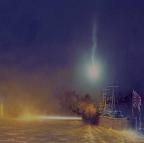SpitfireIX
Posts: 264
Joined: 1/9/2003
From: Fort Wayne IN USA
Status: offline

|
quote:
ORIGINAL: grumbler
quote:
ORIGINAL: SpitfireIX
First of all, I haven't seen any evidence that the radar was operational any significant portion of the time--as I mentioned, it could have been down for modification or repairs a lot, and operators might have needed a lot of on-the-job training. In fact, the one source we've seen so far states that it was "experimental."
True, but many aircraft appear when they were still "experimental." Japanese LCU values are based on what they achieved in spite of the fact that their tactics in 1941 were "experimental."
Your analogies are specious. Which aircraft appear while they are still "experimental?" In fact, the P-38 doesn't even begin to arrive until late 1942, when several earlier marks had already been produced by the hundreds and entered service (even in the Pacific theater). The B-29 first flew in 1942, and so did the first Hellcat. The first Avenger flew in the summer of 1941. I could go on and on.
Exactly how were the Japanese tactics "experimental?" Are you possibly alluding to an alleged lack of combat experience? If so, you are forgetting that the IJA had been fighting in China for years. And even if your claim of "experimental" tactics had any merit, to liken the success of untried army units against the even greener, ill-supplied, ill-equipped units the Allies had in the field early in the war to the development of a radical new technology is absurd.
quote:
Lacking evidence that the radar sets were not, in fact, operational, i would say the burden is on you.
I have given my evidence--the web page referenced in this thread states that the Type 13 radar was deployed "experimentally" in 1941, but not "operationally" until March 1943.
It further states that the "Oi, Kitagami [sic] " received the Type 13 radar in 1941 "month unknown."
The burden is now on you to either show that a) my evidence is incorrect, or b) that "experimental" radar should have similar capabilities to "operational" radar in game terms. Your two fatuous analogies do nothing to advance your argument.
quote:
quote:
But even if it does turn out that the radar was operationally effective by the end of 1941, this still goes to the issue of whether the Japanese high command could realistically have assigned these units to escort the carriers. Not an issue, because I AM the Japanese High Command! 
I reiterate what I told Twotribes: If you want to modify the database to give your favorite side ahistorical advantages, or pursue ahistorical strategies, and your opponent is amenable, knock yourself out. But I'm talking about making the unmodified database as historical as possible.
Furthermore, if you want to argue that as the Japanese high command you can do anything you want, then I will argue that as the Allied Pacific theater commander, I order all units to full alert at 12:30 a.m. Hawaii time on December 7, because I can use my hindsight. I also want to order that all faulty torpedoes be immediately fixed. I'll also argue that I should be able to have free setup, because I could have used my hindsight to reorganize all the Allied forces in the Pacific during November 1941.
_____________________________
"I know Japanese. He is very bad. And tricky. But we Americans too smart. We catch him and give him hell."
--Benny Sablan, crewman, USS Enterprise 12/7/41
|
 Printable Version
Printable Version













 I dont see this in the ship database. The torps stay the same with the upgrades.
I dont see this in the ship database. The torps stay the same with the upgrades.

 New Messages
New Messages No New Messages
No New Messages Hot Topic w/ New Messages
Hot Topic w/ New Messages Hot Topic w/o New Messages
Hot Topic w/o New Messages Locked w/ New Messages
Locked w/ New Messages Locked w/o New Messages
Locked w/o New Messages Post New Thread
Post New Thread